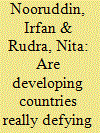|
|
|
Sort Order |
|
|
|
Items / Page
|
|
|
|
|
|
|
| Srl | Item |
| 1 |
ID:
134835


|
|
|
|
|
| Summary/Abstract |
This study evaluates the embedded liberalism hypothesis in a broad swath of less developed countries (LDCs). The authors find that LDC governments pursue a distinct welfare state policy that protects citizens from economic insecurities associated with global market expansion. Specifically, governments use public employment—and particularly employment in civil services and administration—to foster domestic stability alongside market expansion. However, such jobs are targeted to politically salient groups, not poorer groups that might also face increased economic uncertainty postopenness. In turn, public employment shores up public support for openness. The authors' findings suggest that free traders have reasons both to celebrate and to bemoan this LDC embedded liberalism compact. On the positive side, LDC governments are working hard to maintain political support for free trade; on the other hand, the compromise of protecting privileged groups at the expense of others in society raises questions about the long-term sustainability of their strategy.
|
|
|
|
|
|
|
|
|
|
|
|
|
|
|
|
| 2 |
ID:
134451


|
|
|
|
|
| Summary/Abstract |
Structural adjustment programs of the International Monetary Fund (IMF) are often blamed for disrupting social relations by forcing austerity on vulnerable people and introducing unpopular liberalization policies. Some suggest that such interventions harm ethnic relations in developing countries because they are insensitive to the tenuous social bargains that often preserve ethnic peace. Moreover, during crises, dominant groups may seek to displace the pain of reform on others, the ethnic division of labour may be affected differentially by reform policies, and ethnic entrepreneurs could use moments of crisis to their advantage. We test the propositions by using unique data measuring the level of ethnic tensions in a country. The results show that IMF interventions reduce conditions of ethnic enmity. These results are robust to fixed effects estimation, endogeneity and selection effects. Moreover, IMF interventions lower ethnic tension in countries that are highly fractionalized, but they are more problematic where larger groups face each other and when larger groups are excluded from state power. These results suggest too that IMF interventions may lead to greater empowerment of excluded groups who might agitate for change during periods of economic crisis. On balance, IMF interventions, relative to continued economic woe, pacify ethnic relations in crisis-ridden countries. We find no evidence to suggest that IMF programs increase ethnic tensions, which is good news for poor countries requiring cheap loans and assistance with reforms.
|
|
|
|
|
|
|
|
|
|
|
|
|
|
|
|
| 3 |
ID:
136837


|
|
|
|
|
| Summary/Abstract |
Dr. B.R.Ambedkar commonly regarded as “father of the Indian Constitution” was crowned posthumously with the highest civilian award the Bharat Ratna” in recognition of his services to the nation as a great freedom fighter, statesman, scholar, writer, educationist and constitutional expert. He wanted India to be a strong one, immune from the virus of castism, parochialism and communalism. He firmly believe that in absence of economic and social justice, political independence would not bring about either social solidarity or national integration.
|
|
|
|
|
|
|
|
|
|
|
|
|
|
|
|
| 4 |
ID:
137026


|
|
|
|
|
| Summary/Abstract |
This contribution examines the role of capitalism in anti-American terrorism. It uses two theoretical frameworks, both of which contrast the pacifying effects of higher levels of capitalist development with the potentially destabilizing effects of a transition towards capitalism, but differ with respect to their definition of capitalism, capitalism’s interaction with anti-American terrorism, and its empirical operationalization. Using panel data for 149 countries between 1970 and 2007 and providing further system-level time-series evidence, this contribution finds no support for hypotheses derived from the classical capitalist peace literature. There is no evidence that anti-American terrorism increases with external economic liberalization or that it decreases with higher levels of economic openness. By contrast, hypotheses derived from economic norms theory find empirical support. Conceptualizing capitalism as social market-capitalism, this article finds that higher levels of market-capitalism are associated with less anti-American terrorism, while the process of marketization fuels it. Consistent with expectations from economic norms theory, the destabilizing effects of the marketization process may stem from the violent opposition of antimarket interest groups that have benefited from the pre-market order to the economic-cultural change initiated by a transition towards a market economy. These interest groups deliberately target the USA as the main proponent of market-capitalism, globalization, and modernity, where anti-American terrorism serves the purpose of consolidating their societal position, rolling back pro-market reforms and limiting the perceived Americanization of their communities. This contribution’s findings suggest that the USA may ultimately become a less likely target of transnational terrorism through the establishment of market economies, but should not disregard the disruptive economic-cultural effects of the marketization process in non-market economies.
|
|
|
|
|
|
|
|
|
|
|
|
|
|
|
|
|
|
|
|
|